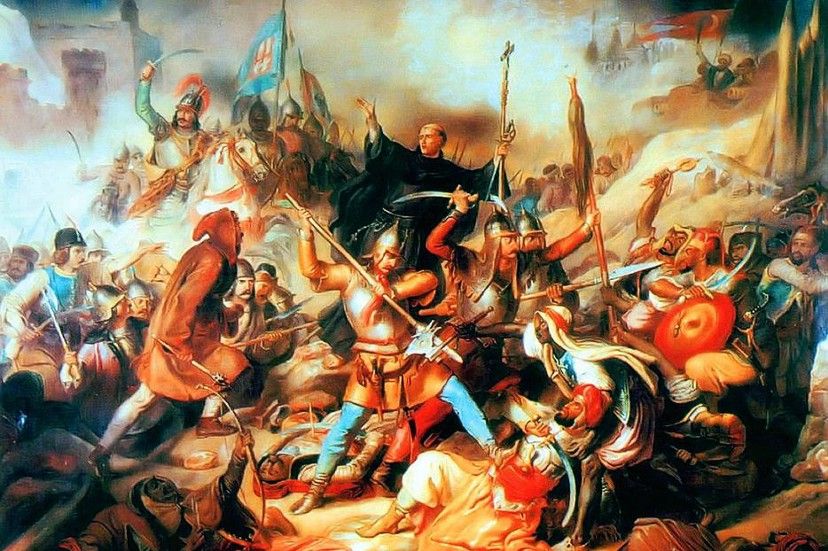A lawyer, a soldier, a governor, a friar, a man of many hats, St. John followed God’s will rigorously, no matter where it took him.
“I had never thought about embracing such a life; still, if God so will it, I will obey.” St. John of Capistrano
On June 24, 1386, in the small town of Capistrano, Italy, St. John was born. His father passed away when he was just a young boy, so he was raised primarily by his mother. As a teenager, he studied law at the University of Perugia and became a lawyer. After serving as a lawyer for some time, King Ladislaus of Naples appointed him governor of Perugia at the ripe age of 26. During his stint as governor, a war broke out between Perguria and Malatestas, an Italian family of great prestige. St. John served as an ambassador to try to bring peace, but his efforts were in vain and he was thrown into prison.
While in prison, St. John had time to reassess his life and began studying theology. In his cell he had a vision of a Franciscan friar surrounded by light who encouraged him to join the Franciscan order. He promptly upheaved his life, dropping everything, and joined the order immediately after being released from prison.
In 1420, before he was even ordained, St. John began preaching and instructing the faithful, which was the start of a long and very successful vocation as a preacher. Throughout his life, he preached all over Europe, from Italy to Germany, even going as far as Russia and Spain. As word of his efficacious sermons began to spread, he began to garner huge crowds, to the point where even the largest churches weren’t big enough for his sermons. Eventually he was forced to preach in public squares and farmers’ fields just to be able to fit everyone.
Catholics eager to hear him congregated in the tens of thousands. Numbers of 50,000 or 80,000 were not uncommon. One time a crowd gathered of 126,000! Just to let that sink in, the largest Super Bowl attendance ever was 103,000. He was able to preach God’s message so effectively that every time he spoke there were dozens of conversions. Even the most hardened of heretics came back to the Church after listening to him. His talks brought hundreds of young men to join the Franciscans, which began to flourish through his efforts.
He radiated holiness and passion and was known for speaking boldly with great enthusiasm. He carried with him a perpetual optimism, so much so that his very appearance touched people’s hearts.
“Those who are called to the table of the Lord must glow with the brightness that comes from the good example of a praiseworthy and blameless life. They must learn from the eminent teacher, Jesus Christ. ‘You are the light of the world’ Matthew 5:14. Now a light does not illumine itself but instead it diffuses its rays and shines all around upon everything that comes into its view.” St. John of Capistrano
His influence didn’t stop with just laypeople. Following a strict ascetism and more rigorous rule, he, along with St. Bernadine, reformed the Franciscan order to follow St. Francis of Assisi more fully. Several popes also sought his aid, being placed in charge of the Council of Florence, as well as fighting off several heresies of the time.
By 1453, Constantinople had fallen and Mohamed II threatened Christian Europe. Pope Callixtus III sent St. John to preach a crusade to defend against the Turks. At the age of 70, retirement not being something he believed in, he promptly followed the Pope’s wishes and began gathering soldiers for a crusade. Gathering a group of about 50,000 passionate, but poorly trained men, St. John, along with General John Hunyadi, led an army against the Turks. Literally leading his men into battle, invoking Jesus’s name throughout, yelling “Victory, Jesus, Victory!,” they defeated a Turkish force that was ten times larger than their own, forcing a retreat, and saving Europe from an invasion.

Shortly after this historic victory, the fatigue of war and battle eventually caught up to him, and he fell victim to the plague and died in Croatia on October 23, 1456.
St. John of Capistrano performed his duties 110 percent, always exceeding expectations in everything he did. Never complaining and always accepting, he lived his life not for himself, but for God, completing whatever was asked of him.
May we capture some of that perfect obedience to God’s will that St. John possessed, doing whatever God asks of us and going wherever He leads us, no matter the cost.
“The Lord who made the beginning, will take care of the finish.” St. John of Capistrano



